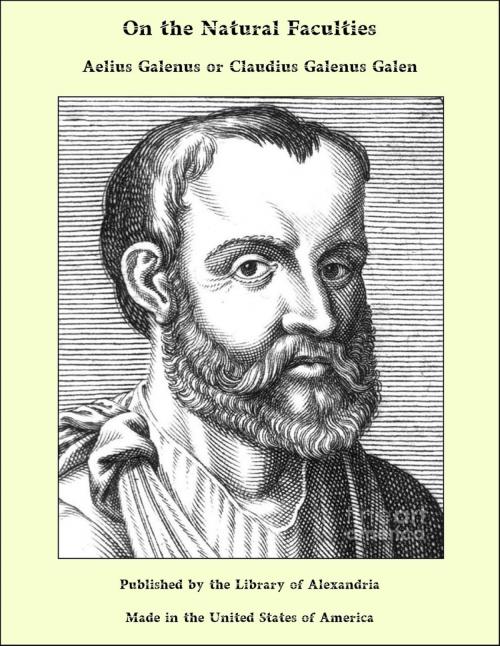On the Natural Faculties
Nonfiction, Religion & Spirituality, New Age, History, Fiction & Literature| Author: | Aelius Galenus or Claudius Galenus Galen | ISBN: | 9781465607911 |
| Publisher: | Library of Alexandria | Publication: | March 8, 2015 |
| Imprint: | Language: | English |
| Author: | Aelius Galenus or Claudius Galenus Galen |
| ISBN: | 9781465607911 |
| Publisher: | Library of Alexandria |
| Publication: | March 8, 2015 |
| Imprint: | |
| Language: | English |
At the dawn of recorded medical history Hippocrates stands for the fundamental and primary importance of seeing clearly—that is of clinical observation. And what he observed was that the human organism, when exposed to certain abnormal conditions—certain stresses—tends to behave in a certain way: that in other words, each “disease” tends to run a certain definite course. To him a disease was essentially a process, one and indivisible, and thus his practical problem was essentially one ofprognosis—“what will be the natural course of this disease, if left to itself?” Here he found himself to no small extent in opposition with the teaching of the neighbouring medical school of Cnidus, where a more static view-point laid special emphasis upon the minutiae of diagnosis. Observation taught Hippocrates to place unbounded faith in the recuperative powers of the living organism—in what we sometimes call nowadays the vis medicatrix Naturae. His observation was that even with a very considerable “abnormality” of environmental stress the organism, in the large majority of cases, manages eventually by its own inherent powers to adjust itself to the new conditions. “Merely give Nature a chance,” said the father of medicine in effect, “and most diseases will cure themselves.” And accordingly his treatment was mainly directed towards “giving Nature a chance.” His keen sense of the solidarity (or rather, of the constant interplay) between the organism and its environment (the “conditions” to which it is exposed) is instanced in his book, “Airs, Waters, and Places.” As we recognise, in our popular everyday psychology, that “it takes two to make a quarrel,” so Hippocrates recognised that in pathology, it takes two (organism and environment) to make a disease. As an outstanding example of his power of clinical observation we may recall the facies Hippocratica, an accurate study of the countenance of a dying man. At the same time, while assigning the physician his post, Hippocrates would not let him regard that post as sacrosanct. He set his face against any tendency to mystery-mongering, to exclusiveness, to sacerdotalism. He was, in fact, opposed to the spirit of trade-unionism in medicine. His concern was rather with the physician’s duties than his “rights.”
At the dawn of recorded medical history Hippocrates stands for the fundamental and primary importance of seeing clearly—that is of clinical observation. And what he observed was that the human organism, when exposed to certain abnormal conditions—certain stresses—tends to behave in a certain way: that in other words, each “disease” tends to run a certain definite course. To him a disease was essentially a process, one and indivisible, and thus his practical problem was essentially one ofprognosis—“what will be the natural course of this disease, if left to itself?” Here he found himself to no small extent in opposition with the teaching of the neighbouring medical school of Cnidus, where a more static view-point laid special emphasis upon the minutiae of diagnosis. Observation taught Hippocrates to place unbounded faith in the recuperative powers of the living organism—in what we sometimes call nowadays the vis medicatrix Naturae. His observation was that even with a very considerable “abnormality” of environmental stress the organism, in the large majority of cases, manages eventually by its own inherent powers to adjust itself to the new conditions. “Merely give Nature a chance,” said the father of medicine in effect, “and most diseases will cure themselves.” And accordingly his treatment was mainly directed towards “giving Nature a chance.” His keen sense of the solidarity (or rather, of the constant interplay) between the organism and its environment (the “conditions” to which it is exposed) is instanced in his book, “Airs, Waters, and Places.” As we recognise, in our popular everyday psychology, that “it takes two to make a quarrel,” so Hippocrates recognised that in pathology, it takes two (organism and environment) to make a disease. As an outstanding example of his power of clinical observation we may recall the facies Hippocratica, an accurate study of the countenance of a dying man. At the same time, while assigning the physician his post, Hippocrates would not let him regard that post as sacrosanct. He set his face against any tendency to mystery-mongering, to exclusiveness, to sacerdotalism. He was, in fact, opposed to the spirit of trade-unionism in medicine. His concern was rather with the physician’s duties than his “rights.”















